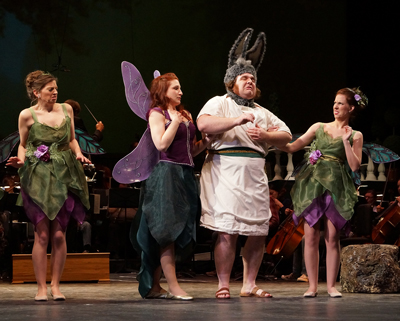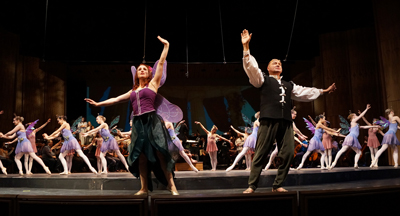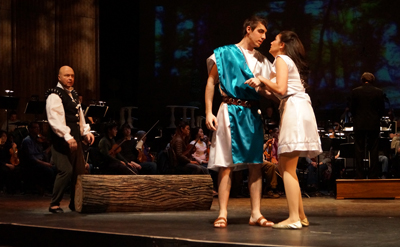by Daniel Hathaway

In Shakespeare’s words, the stage of E.J. Thomas Hall was “translated” for the occasion. The orchestra was divided into three triangular groupings on upstage risers with paths between them leading to a colonnaded playing area at the top. Downstage, a pair of balconies with ladders framed the proscenium. A scrim emblazoned with the title of the show was in place when the audience arrived; lights came up behind it to provide a gauzy ambiance for Mendelssohn’s magical overture.The next two-and-three-quarter hours were an enthralling, fast-paced liaison of music, words and movement as Shakespeare’s hilarious fairy tale put Athenians into the hands of mischievous night-sprites, confounded their amorous relationships, then set everything back to rights again, with comic relief from perhaps as funny a set of Rude Mechanicals as ever took on “The most lamentable comedy, and most cruel death of Pyramus and Thisby.”
Seeded by four Equity actors, the well-chosen cast rose to impressive dramatic heights, and thanks to good body mics and fine sound engineering, their words carried perfectly no matter where they appeared onstage.
John Hedges and Elana Kepner brought noble bearing to the roles of Theseus/Oberon and Hippolyta/Titania, even when the pair were playing tricks on unwary mortals. William John Liptak as Lysander, Alex Funk as Demetrius, Natalie Welch as Hermia and Kyra Kelley as Helena made a winning quartet of confused young lovers. Stuart Hoffman, barefoot and as athletic as a gymnast, grabbed your attention every time Puck entered the scene.
And those mechanicals! Bob Russell (Bottom), Terence Cranendonk (Peter Quince), Andrew Knode (Francis Flute), Mark Seven (Snout), Ryan Nehlen (Snug) and Michele McNeal (Starveling) inhabited their individual characters with bumbling brilliance and made for a hilarious sextet of miscast thespians. Russell delivered his malapropisms with singular conviction and was hilarious as an ass. Knode brought down the house with his unwilling but committed portrayal of Thisby.
Rounding out the cast were MaryBeth Hobson, Catie Hewitt, Karla Cummins and Anna E. White as Cobweb, Peaseblossom/Philostrate, Moth and Mustardseed, respectively.
Mendelssohn’s splendid music included not only the big pieces that get played as a suite (Overture, Scherzo, Nocturne and Wedding March), but the smaller movements with voices (Ye spotted snakes, and Though the house give glimmering light) and other little melodramas and snippets of musical cues that give punctuation to the dramatic flow. The orchestra did a splendid job with all the musical components, bringing otherworldly delicacy as well as earthy humor to the overture, airiness to the Scherzo, mellifluous blend to the Nocturne and brassy splendor to the Wedding March. Wilkins and the ensemble were completely attentive to even the smaller cues, which arrived with perfect timing.
The children’s choir added a wonderful freshness to its two assignments and the stylish dancers of Ballet Excel Ohio (Mia Klinger, artistic director and Eric Yetter, choreographer) enlivened the beginning and end of the evening with graceful movement.
Craig Joseph’s expert stage direction was a model of clarity and imaginative space usage and sensitive cuts in the text brought the show in under three hours, with intermission. If another five minutes’ worth might have been sacrificed, it could have come from the latter part of “Pyramus and Thisby” — all the laughs had already been had.
Photos by Michael Lawrence Akers.
Published on ClevelandClassical.com March 11, 2014
Click here for a printable version of this article.






